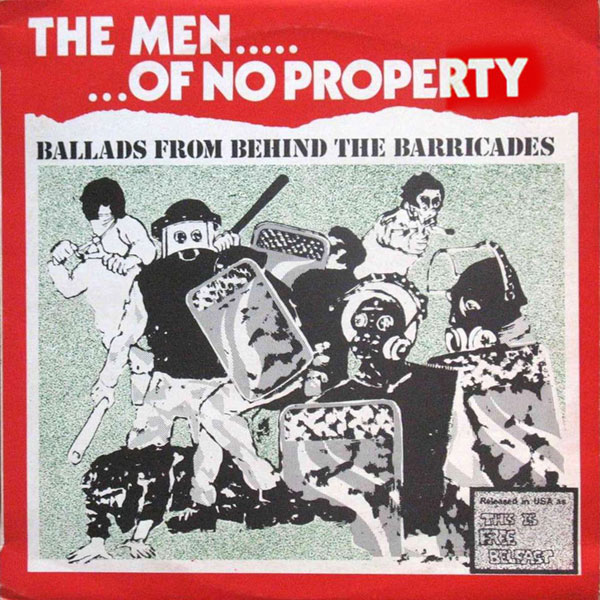

Sleeve Notes
Cry Murder — A song in memory of Patrick Rooney, aged 9, murdered in his bed on August 9th, 1969 by RUC men firing up and down the Falls Road in Belfast from their armoured car.
Burntollet Bridge Ambush — The ambush on members and supports of People's Democracy on their march to Derry occurred on January 4th, 1969. It was carried out by armed members of the notorious B Specials with the active assistance of members of the RUC and prominent Unionist politicians. Over 100 unarmed marchers were injured, some seriously.
Its A Man's Life in The Army — Anti-recruiting song, written in 1970.
Craig's Dragoons — In "honour" of William Craig, whose RUC men so gallantly attacked unarmed Civil Rights demonstrators in Duke St., Derry, September 1968.
Hughes Bakery Van — In honour of Barney Hughes bakery van, hi-jacked by the people of the Falls Road in 1969 and responsible for saving many a life.
The Bogside Doodlebug — Dedicated to the gallant band of Derry Youngsters of 1968-70 — vintage years — and the doodlebug itself the people's weapon.
Ballad of Carrick Hill — This heartwarming little song was actually written some years before the present "trouble" and relates the heroic defense of Carrick Hill by a handful of local "Punters". Some of these gallant folk are still with us, but, alas the fabled Buxie Drummond is no more, murdered by a coward's bomb in 1974.
The Great Eel Robbery — N. Ireland's Lough Neagh is the richest eel fishing ground in Europe. For centuries the wealth of the Lough was stolen, first by English robber barons like the Chichesters and then by the Dutch Toome Eel Fisheries. They have now gone, and a form of co-op runs the eel fisheries, but there's still a long way to go until the fishermen of Lough Neagh are free.
The Smuggling Men — Around the border areas, Merlyn Rees' "bandit country", smuggling is an indigenous industry. Today, despite spiked and cratered roads, it still flourishes.
The Bogside Man — Commemorates the "Battle of the Bogside" when 3,000 RUC men where drive back by the men, women and kids of Derry after 3 days of attack with gas and water cannons.
Rubber Bullets — The army now call them "baton rounds" but they still have killed three young children with them and wounded and maimed many more, including 5 people blinded, the PVC bullets now used are even more dangerous.
Ballymurphy — A simple song with a simple refrain.
Ballad of Lynch's Army — A song celebrating the treacherous and cowardly behaviour of "I forget" Lynch, former leading British lackey in Dublin, in 1969. His successors are even are worse, of course. During the attempted pogrom in the North in 1969 Jack Lynch sent his troops to the Border and no further. Although meant to appease those who would not stand idly by, it actually exposed the Pseudo Nationalist pretenses of Lynch and his party.
This is Free Belfast by The Men of no Property
This is in its way, an historic record. It was recorded in October 1970 in Belfast and released by Paredon Records in America in 1971. Aprart from some 50 copies imported into Ireland in 1972 it has never been sold in Ireland or England despite the underground reputation that it has been building for itself in the States and on the Continent for the last five years. The songs on the album date from the barricades in 1969 and 1970. They have not dated.
The repression endured by the Irish people may have greatly increased the number of deaths may have greatly escalated, but for Ireland. North and South, the fight goes on Resistance Records are to be congratulated on issuing for the first time in Ireland, this valuable recording of the barricades.
Arthur O'Connell.